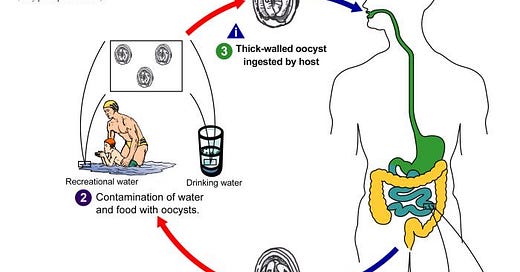Public Health Wales report eight additional cases of cryptosporidium have been identified following visits to a Cowbridge farm in March and April 2025.
This brings the outbreak total to 89 linked to visits to Cowbridge Farm Shop at Marlborough Grange Farm, Cross Ways, Cowbridge, CF71 7LJ.
The farm voluntarily stopped all public animal feeding activities on 29 April and have continued their ongoing support to the investigation. The Outbreak Control Team would like to thank the business for their cooperation and support as this outbreak begins to draw to a close.
Cryptosporidium is a parasite that can cause gastrointestinal illness, often associated with contact with animals, especially young farm animals such as calves and lambs. Public Health experts are warning those who have come into contact with infected cases to take extra care to avoid passing the infection onto others.
Su Mably, Consultant in Health Protection at Public Health Wales, said:
“We are continuing to work closely with our partners to investigate this outbreak and prevent any further spread of infection. Cryptosporidium usually clears up on its own, but it can cause more serious illness in young children and people with weaker immune systems.
“Cryptosporidium can also spread from person to person. If you develop symptoms after being in contact with someone who became ill following a visit to the farm, it’s important to get medical advice. Washing your hands properly at home, especially before eating or preparing food, is one of the best ways to stop the infection spreading.”
The main symptoms of cryptosporidium infection include:
Watery diarrhea
Stomach pains or cramps
Nausea or vomiting
Mild fever
Loss of appetite
Weight loss
The symptoms usually start between two and 10 days after exposure and can last for up to two weeks.
To help reduce the risk of infection, people visiting farms are reminded to follow these hygiene precautions:
Avoid close contact with animals – including holding, cuddling or kissing animals – this significantly increases the risk of illness.
Always wash your hands thoroughly with soap and warm water after touching animals, footwear, clothing, bikes, scooters, prams etc. before eating or drinking. Alcohol based hand gels do not provide sufficient cleaning.
The mechanical action of washing with soap and water is the most reliable way to remove the parasite from the skin.
Supervise children closely to ensure they wash their hands properly and to avoid close contact, especially cuddling or kissing the animals.
Do not eat or drink while touching animals or walking around the farm.
Remove and clean footwear and wash hands after leaving the farm.
Pregnant women should take particular care to avoid contact with newborn lambs during lambing season.





